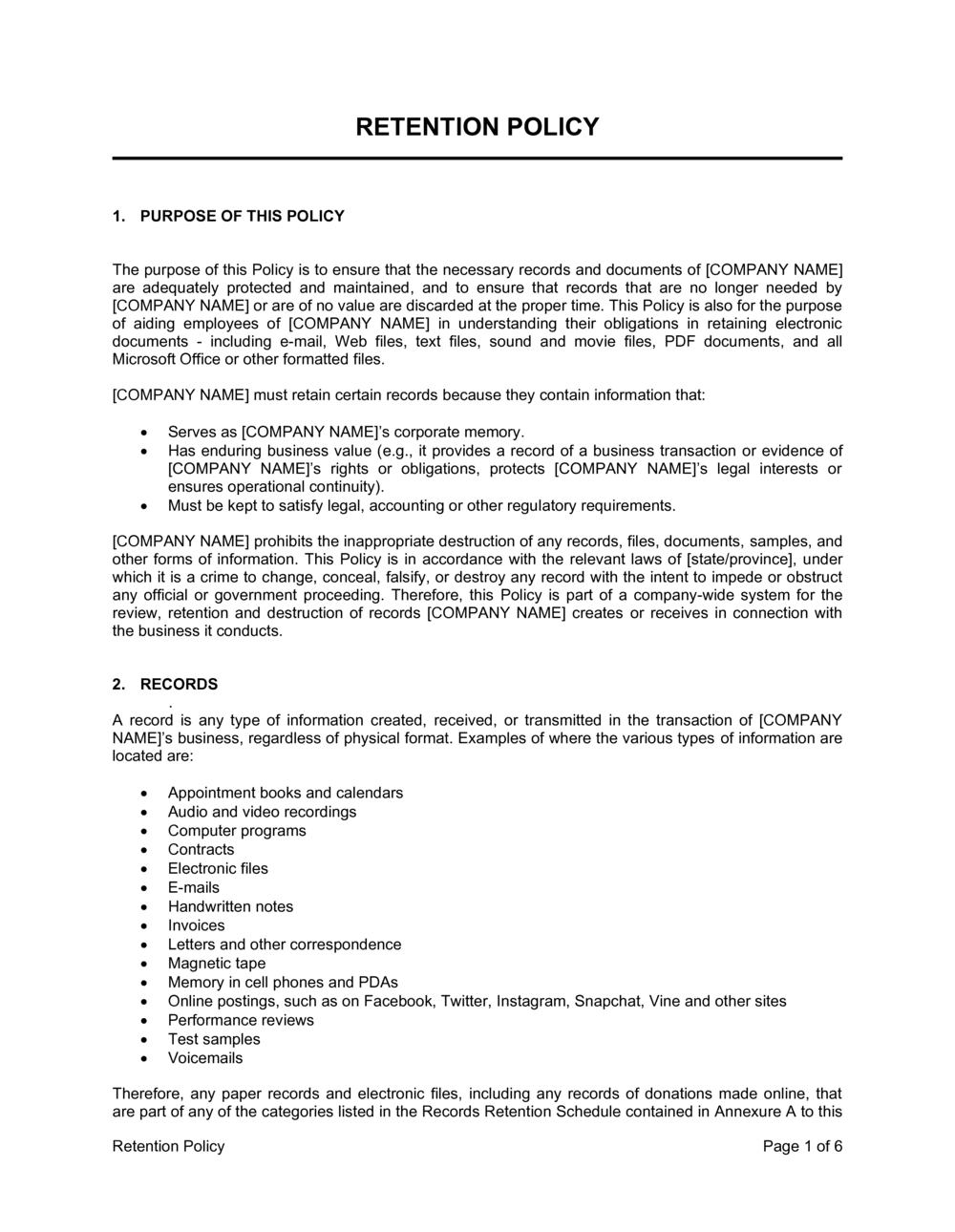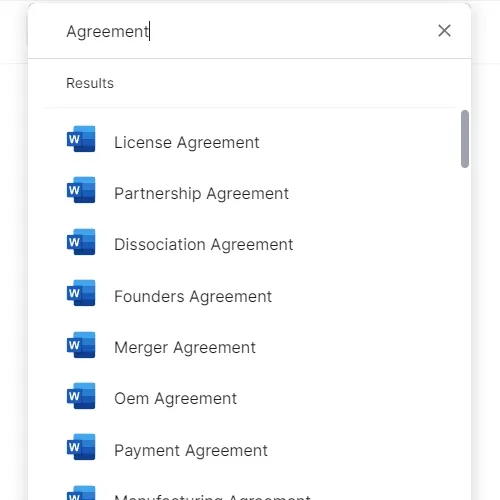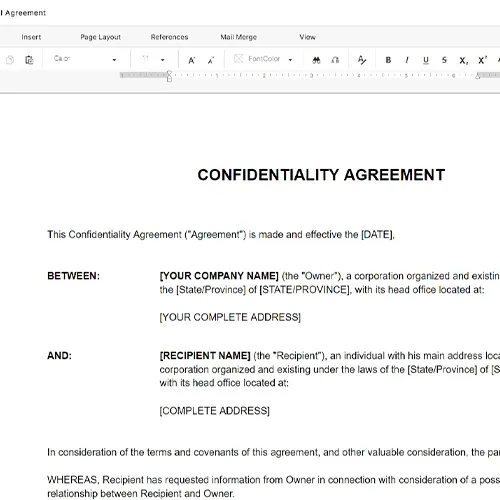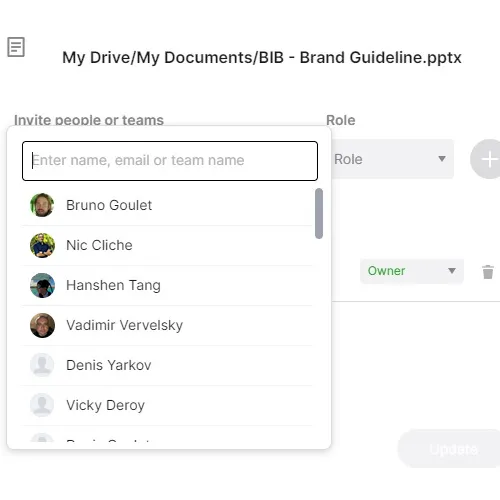Retention Policy Template

Document content
This retention policy template has 6 pages and is a MS Word file type listed under our human resources documents.
Sample of our retention policy template:
RETENTION POLICY PURPOSE OF THIS POLICY The purpose of this Policy is to ensure that the necessary records and documents of [COMPANY NAME] are adequately protected and maintained, and to ensure that records that are no longer needed by [COMPANY NAME] or are of no value are discarded at the proper time. This Policy is also for the purpose of aiding employees of [COMPANY NAME] in understanding their obligations in retaining electronic documents - including e-mail, Web files, text files, sound and movie files, PDF documents, and all Microsoft Office or other formatted files. [COMPANY NAME] must retain certain records because they contain information that: Serves as [COMPANY NAME]'s corporate memory. Has enduring business value (e.g., it provides a record of a business transaction or evidence of [COMPANY NAME]'s rights or obligations, protects [COMPANY NAME]'s legal interests or ensures operational continuity). Must be kept to satisfy legal, accounting or other regulatory requirements. [COMPANY NAME] prohibits the inappropriate destruction of any records, files, documents, samples, and other forms of information. This Policy is in accordance with the relevant laws of [state/province], under which it is a crime to change, conceal, falsify, or destroy any record with the intent to impede or obstruct any official or government proceeding. Therefore, this Policy is part of a company-wide system for the review, retention and destruction of records [COMPANY NAME] creates or receives in connection with the business it conducts. RECORDS . A record is any type of information created, received, or transmitted in the transaction of [COMPANY NAME]'s business, regardless of physical format. Examples of where the various types of information are located are: Appointment books and calendars Audio and video recordings Computer programs Contracts Electronic files E-mails Handwritten notes Invoices Letters and other correspondence Magnetic tape Memory in cell phones and PDAs Online postings, such as on Facebook, Twitter, Instagram, Snapchat, Vine and other sites Performance reviews Test samples Voicemails Therefore, any paper records and electronic files, including any records of donations made online, that are part of any of the categories listed in the Records Retention Schedule contained in Annexure A to this Policy, must be retained for the amount of time indicated in the Records Retention Schedule. A record must not be retained beyond the period indicated in the Record Retention Schedule unless a valid business reason (or a litigation hold or other special situation) calls for its continued retention. If you are unsure whether to retain a certain record, contact the Records Management Officer or the Legal Department. DISPOSABLE INFORMATION Disposable information consists of data that may be discarded or deleted at the discretion of the user once it has served its temporary useful purpose and/or data that may be safely destroyed because it is not a record as defined by this Policy. Examples may include: Duplicates of originals that have not been annotated. Preliminary drafts of letters, memoranda, reports, worksheets and informal notes that do not represent significant steps or decisions in the preparation of an official record. Books, periodicals, manuals, training binders and other printed materials obtained from sources outside of [COMPANY NAME] and retained primarily for reference purposes. Spam and junk mail. CONFIDENTIAL INFORMATION BELONGING TO OTHERS Any confidential information that an employee may have obtained from a source outside of [COMPANY NAME], such as a previous employer, must not, so long as such information remains confidential, be disclosed to or used by [COMPANY NAME]. Unsolicited confidential information submitted to [COMPANY NAME] should be refused, returned to the sender where possible and deleted, if received via the internet. MANDATORY COMPLIANCE [COMPANY NAME] strives to comply with the laws, rules and regulations by which it is governed and with recognized compliance practices. All company employees must comply with this Policy, the Records Retention Schedule and any litigation hold communications. Failure to do so may subject [COMPANY NAME], its employees and contract staff to serious civil and/or criminal liability. An employee's failure to comply with this Policy may result in disciplinary sanctions, including suspension or termination. REPORTING POLICY VIOLATIONS [COMPANY NAME] is committed to enforcing this Policy as it applies to all forms of records. The effectiveness of [COMPANY NAME]'s efforts, however, depends largely on employees. If you feel that you or someone else may have violated this Policy, you should report the incident immediately to your supervisor. If you are not comfortable bringing the matter up with your immediate supervisor, or do not believe the supervisor has dealt with the matter properly, you should raise the matter with the Records Management Officer/manager at the next level above your direct supervisor. If employees do not report inappropriate conduct, [COMPANY NAME] may not become aware of a possible violation of this Policy and may not be able to take appropriate corrective action. No one will be subject to and [COMPANY NAME] prohibits, any form of discipline, reprisal, intimidation or retaliation for reporting incidents of inappropriate conduct of any kind, pursuing any record destruction claim or cooperating in related investigations. RECORDS MANAGEMENT DEPARTMENT The Records Management Department is responsible for identifying the documents that [COMPANY NAME] must or should retain, and determining, in collaboration with the Legal Department, the proper period of retention. It also arranges for the proper storage and retrieval of records, coordinating with outside vendors where appropriate. Additionally, the Records Management Department handles the destruction of records whose retention period has expired. RECORDS MANAGEMENT OFFICER [COMPANY NAME] has designated [EMPLOYEE NAME] as the Records Management Officer
3,000+ Templates & Tools to Help You Start, Run & Grow Your Business

Document content
This retention policy template has 6 pages and is a MS Word file type listed under our human resources documents.
Sample of our retention policy template:
RETENTION POLICY PURPOSE OF THIS POLICY The purpose of this Policy is to ensure that the necessary records and documents of [COMPANY NAME] are adequately protected and maintained, and to ensure that records that are no longer needed by [COMPANY NAME] or are of no value are discarded at the proper time. This Policy is also for the purpose of aiding employees of [COMPANY NAME] in understanding their obligations in retaining electronic documents - including e-mail, Web files, text files, sound and movie files, PDF documents, and all Microsoft Office or other formatted files. [COMPANY NAME] must retain certain records because they contain information that: Serves as [COMPANY NAME]'s corporate memory. Has enduring business value (e.g., it provides a record of a business transaction or evidence of [COMPANY NAME]'s rights or obligations, protects [COMPANY NAME]'s legal interests or ensures operational continuity). Must be kept to satisfy legal, accounting or other regulatory requirements. [COMPANY NAME] prohibits the inappropriate destruction of any records, files, documents, samples, and other forms of information. This Policy is in accordance with the relevant laws of [state/province], under which it is a crime to change, conceal, falsify, or destroy any record with the intent to impede or obstruct any official or government proceeding. Therefore, this Policy is part of a company-wide system for the review, retention and destruction of records [COMPANY NAME] creates or receives in connection with the business it conducts. RECORDS . A record is any type of information created, received, or transmitted in the transaction of [COMPANY NAME]'s business, regardless of physical format. Examples of where the various types of information are located are: Appointment books and calendars Audio and video recordings Computer programs Contracts Electronic files E-mails Handwritten notes Invoices Letters and other correspondence Magnetic tape Memory in cell phones and PDAs Online postings, such as on Facebook, Twitter, Instagram, Snapchat, Vine and other sites Performance reviews Test samples Voicemails Therefore, any paper records and electronic files, including any records of donations made online, that are part of any of the categories listed in the Records Retention Schedule contained in Annexure A to this Policy, must be retained for the amount of time indicated in the Records Retention Schedule. A record must not be retained beyond the period indicated in the Record Retention Schedule unless a valid business reason (or a litigation hold or other special situation) calls for its continued retention. If you are unsure whether to retain a certain record, contact the Records Management Officer or the Legal Department. DISPOSABLE INFORMATION Disposable information consists of data that may be discarded or deleted at the discretion of the user once it has served its temporary useful purpose and/or data that may be safely destroyed because it is not a record as defined by this Policy. Examples may include: Duplicates of originals that have not been annotated. Preliminary drafts of letters, memoranda, reports, worksheets and informal notes that do not represent significant steps or decisions in the preparation of an official record. Books, periodicals, manuals, training binders and other printed materials obtained from sources outside of [COMPANY NAME] and retained primarily for reference purposes. Spam and junk mail. CONFIDENTIAL INFORMATION BELONGING TO OTHERS Any confidential information that an employee may have obtained from a source outside of [COMPANY NAME], such as a previous employer, must not, so long as such information remains confidential, be disclosed to or used by [COMPANY NAME]. Unsolicited confidential information submitted to [COMPANY NAME] should be refused, returned to the sender where possible and deleted, if received via the internet. MANDATORY COMPLIANCE [COMPANY NAME] strives to comply with the laws, rules and regulations by which it is governed and with recognized compliance practices. All company employees must comply with this Policy, the Records Retention Schedule and any litigation hold communications. Failure to do so may subject [COMPANY NAME], its employees and contract staff to serious civil and/or criminal liability. An employee's failure to comply with this Policy may result in disciplinary sanctions, including suspension or termination. REPORTING POLICY VIOLATIONS [COMPANY NAME] is committed to enforcing this Policy as it applies to all forms of records. The effectiveness of [COMPANY NAME]'s efforts, however, depends largely on employees. If you feel that you or someone else may have violated this Policy, you should report the incident immediately to your supervisor. If you are not comfortable bringing the matter up with your immediate supervisor, or do not believe the supervisor has dealt with the matter properly, you should raise the matter with the Records Management Officer/manager at the next level above your direct supervisor. If employees do not report inappropriate conduct, [COMPANY NAME] may not become aware of a possible violation of this Policy and may not be able to take appropriate corrective action. No one will be subject to and [COMPANY NAME] prohibits, any form of discipline, reprisal, intimidation or retaliation for reporting incidents of inappropriate conduct of any kind, pursuing any record destruction claim or cooperating in related investigations. RECORDS MANAGEMENT DEPARTMENT The Records Management Department is responsible for identifying the documents that [COMPANY NAME] must or should retain, and determining, in collaboration with the Legal Department, the proper period of retention. It also arranges for the proper storage and retrieval of records, coordinating with outside vendors where appropriate. Additionally, the Records Management Department handles the destruction of records whose retention period has expired. RECORDS MANAGEMENT OFFICER [COMPANY NAME] has designated [EMPLOYEE NAME] as the Records Management Officer
Easily Create Any Business Document You Need in Minutes.

Access over 3,000+ business and legal templates for any business task, project or initiative.

Customize your ready-made business document template and save it in the cloud.

Share your files and folders with your team. Create a space of seamless collaboration.
Templates and Tools to Manage Every Aspect of Your Business.
Business in a Box Covers Every Business Department
Includes 16 Types of Business Documents You Need
and Achieve Your Business Goals Faster.
